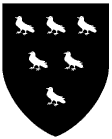
LIVES OF THE BISHOPS OF EXETER
JOHN ARUNDELL, third son of Sir Rainford Arundell of Lanhern, near St. Columb Major in Cornwall, by his wife Jane, daughter of Sir John Coleshull, of Tremadart, knight - a family once so powerful as to be designated by Leland ('Itin.' vol. iii. p. 3) "the great Arundale of Lanherne." He received his education at Exeter College, Oxford, and we find him instituted on 22nd March, 1474, to the rectory of Duloe in his native county; shortly afterwards appointed a canon of Windsor, rector of Sutton Courtenay, prebendary of York and Sarum, elected dean of Exeter late in 1483, consecrated bishop of Lichfield and Coventry on 6th November, 1496, and translated to the government of the see of Exeter on 29th June, 1502. The important office of registrar he committed to a polite scholar John Sixtinus, a Doctor of Laws of the University of Sienna; who, in the prologue to the 'Acts' of his episcopacy, commends his patron for "reflecting honour on his ancient and illustrious pedigree, by his excellent learning and distinguished virtues. Every day his numerous household assembled together in St. Mary's Chapel within Exeter Palace, where the service was conducted with vocal and instrumental music. The most cordial hospitality was maintained; a daily distribution of alms took place at the palace gate. The bishop was anxious to reward merit; and all his chaplains were ready to witness how ready he was to provide in the church for their future comfort." The tenor of his life was distinctly modelled on the doctrine of St. Jerome to Nepotian, "that it is the glory of a bishop to provide for the wants of the poor, and that it is a disgrace to God's priests to be studious of accumulating riches." In the Conventual Church of St. German's, Cornwall, he held an ordination on 23rd September, 1503, as also in his Manorial Chapel at Clist, the 23rd December following. Unfortunately for his diocese this exemplary prelate was prematurely cut off by a short illness at Exeter House, London, on 15th March, 1504, according to his Register, and was buried on the south side of the altar of St. Clement's Church adjoining. He had purchased two messuages in St. Sidwells, which, with the license of King Henry VII., he appropriated to his Dean and Chapter to keep up his obit here. One was called "The Sign of the Ape;" the other was immediately contiguous. At Wardour Castle is a good portrait of the prelate, whilst Bishop of Lichfield and Coventry in 1501.
Arms: - Sable, six - Martlets according to Westcote ; Swallows according to Izacke - three, two, and one, argent. In this Izacke, and not Westcote, is correct.
